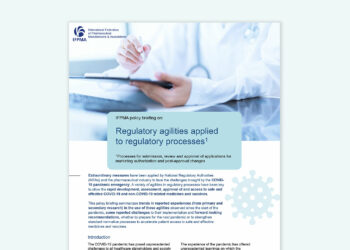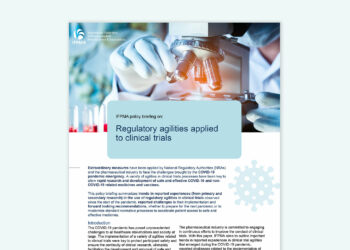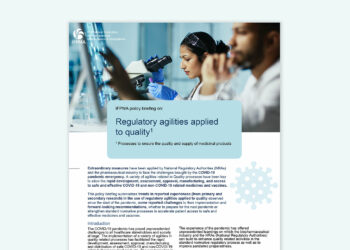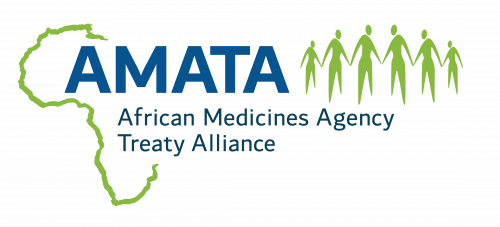Collaboration, convergence, and regulatory reliance


IFPMA acts as a convener and encourages dialogues with national regulatory authorities (NRAs), regional regulatory bodies, and global regulatory networks to address key regulatory hurdles and identify solutions to facilitate patients’ timely access to innovative therapies.
Overview
NRAs, regional regulatory bodies, and global regulatory networks play a vital role in making sure safe, effective, and quality-assured products are available to patients.
Convergence and regulatory reliance helps them achieve this, as does collaboration and constant dialogue with the industry. By working closely with regulatory bodies, our industry carries out its commitment to protecting public health globally. It can also share the benefits of regulatory reliance with NRAs.
Regulatory reliance and convergence are mechanisms that help NRAs, regional regulatory bodies, and global regulatory networks enable resilient health systems.

Many countries have NRAs that make sure medicinal products in their jurisdiction meet required quality, efficacy, and safety standards. They also guard against harmful substandard and falsified products.
Collaboration
IFPMA and our members are strong advocates for aligned standards for medical products and continued support for resource-constrained countries.
The industry provides NRAs, the WHO, and other key stakeholders with industry-wide feedback on guidance documents to help develop coherent, converging, and efficient science-based regulatory policies.
Our input is the product of experience and information gathered across a medicine’s development, conducted by our members.
IFPMA represents the voice of the industry and is a key player in strengthening regulatory systems by contributing to the work of global regulatory networks.

Asia Regulatory Conference
Every two years, IFPMA organizes an Asia Regulatory Conference, bringing together key stakeholders in the Asia region to discuss regulatory trends and find new ways to collaborate.
Convergence and regulatory reliance
IFPMA contributes our industry expertise to developing converged, harmonized norms and standards that enable adequate quality, safety, and efficacy control of medical products globally.
In the past few decades, regional mechanisms intended to harmonize regulations across national boundaries have been developed in Europe, Asia, Africa, and Latin America.
There are also a growing number of global regulatory networks such as the International Council for Harmonisation of Technical Requirements for Pharmaceuticals for Human Use (ICH), the International Coalition of Medicines Regulatory Authorities, and the World Health Organization (WHO). IFPMA is in a recognized relationship with these organizations.
As well as actively supporting these networks, we help forge and extend links between harmonization initiatives that strengthen all regulatory systems.
Other global initiatives adapted the pioneering harmonization work of the ICH or leveraged the use of the WHO requirements for the development, manufacture, and control of active pharmaceutical ingredients and finished pharmaceutical products.
In addition, IFPMA supports the African Medicines Regulatory Harmonization (AMRH) initiative, founded a decade ago in a spirit of partnership and collaboration.
By engaging in the AMRH’s focus areas, we contribute to regulatory reforms at country, regional, and continental levels and encourage the development of regulatory systems aligned with global standards.
IFPMA shares knowledge and best practice experiences on key regulatory priorities such as regulatory reliance, systems strengthening, good manufacturing procedures, certificate of pharmaceutical product, handling of post-approval changes and product samples, and biotherapeutics.
In addition, we participate in various pilot projects to promote the implementation of innovative systems to build experience and trust across NRAs.

Strengthening regulatory systems
Industry supports strengthening regulatory systems and increasing their efficiency by implementing regulatory reliance. We’re confident that its effective implementation will benefit patients, healthcare providers, regulatory authorities, and industry.
Regulatory reliance
Regulatory reliance is the basis of processes by which a regulatory authority in one jurisdiction considers evaluations performed by another while remaining responsible and accountable for the decisions it takes.
According to the WHO, less than 30% of the world’s regulatory authorities “are considered to have the functions required to ensure medicines, vaccines, and other health products work and do not harm patients.”
Regulatory reliance is a response to this challenging situation. It enables regulatory approvals and allows to NRAs to use resources in a more efficient way, as well as strengthens regulatory networks. Ultimately, it serves patients by facilitating earlier access to quality-assured, safe, and effective medicines.
Regulatory reliance is actively promoted by organizations such as the WHO as a way for NRAs to better manage resource capacity and focus on core national activities. As a result, NRAs in all parts of the world are increasingly using regulatory reliance.
IFPMA strongly advocates for increased use of reliance, as it offers opportunities for all stakeholders impacted by regulatory systems. We also advocate for implementing regulatory reliance in regulatory processes throughout a medicine’s lifecycle.
Stakeholders impacted by regulatory systems
Regulatory agilities
NRAs and the industry applied extraordinary measures to meet the challenges brought on by the COVID-19 pandemic.
Exceptional agilities in regulatory, clinical trial, and quality assurance processes have resulted in safe and effective COVID-19 and other medicines being developed rapidly, assessed, approved, and made available. This experience has led to an increased focus on regulatory agilities.
The ongoing benefits of regulatory agilities
Regulatory agilities can help maximize global coordination, collaboration, reliance, and harmonization of regulatory requirements, procedures, and guidelines to facilitate rapid development, approval, and distribution of products aimed at fighting a global health emergency.
They can assist in strengthening regulatory systems by simplifying, harmonizing, and using reliance mechanisms to increase efficiency and accelerate patient access to all medicinal products.
Whether to prepare for the next pandemic or strengthen normal processes, NRAs should consider including recommendations for the use of regulatory agilities into their future strategic plans.

Regulatory agilities and regulatory processes
During the pandemic, agilities in regulatory processes have been key to allowing safe and effective COVID-19 and non-COVID-19 related medicines and vaccines to be rapidly developed, assessed, approved, and accessed.
Read more
Regulatory agilities applied to clinical trials
Implementing agilities related to clinical trials was key to protect participant safety and ensure the continuity of clinical research, enabling safe and effective COVID-19 and non-COVID-19 related pharmaceutical products to be developed and approved.
Read more
Regulatory agilities applied to quality
The COVID-19 pandemic has highlighted the importance of using agilities to minimize disruptions in the global supply chain and risks of drug shortages, and to allow NRAs and manufacturers to rapidly increase manufacturing capacity for producing medicines without compromising their safety and quality.
Read moreRegional focus: Africa
IFPMA and our members believe that regulatory systems focused on Africa must be consistent and predictable to make sure people have timely access to quality medicines and vaccines with proven quality, efficacy, and safety.
Weak or absent regulatory systems can often delay the availability of vital medical products for patients on the continent. They can also lead to low quality or fake medical products and inadequate monitoring of side-effects.

To support this vision, IFPMA has created a network called the Africa Regulatory Network (ARN). Since it was launched, the ARN has provided valuable input into ongoing discussions on regulatory systems strengthening in Africa.
The ARN works in partnership with regulatory authorities, the pharmaceutical industry in Africa, and relevant regulatory stakeholders to encourage greater harmonization and convergence of regulatory requirements. It builds the case that the industry is a key player in regulatory system strengthening by, for example:
IFPMA’s ARN has also supported the long journey toward harmonization, starting in 2009 with the establishment of the African Medicines Regulatory Harmonisation Initiative (AMRH), which paved the way for the African Medicines Agency.
The African Medicines Agency
The African Medicines Agency (AMA) is a specialized agency of the African Union dedicated to assisting Member States in improving their capacities to regulate medical products and health technologies.
For IFPMA and our members, the AMA is a major step forward when it comes to enhancing regulatory oversight and facilitating access to effective, safe, affordable, quality medicines across the continent.
Among other things, the AMA has the potential to:
- Allow more focused resources for value-adding activities and making evidence-based scientific regulatory decisions
- Minimize administrative hurdles
- Allow for increased use of reliance-based procedures and harmonized regulatory requirements across Africa, enabling acceleration and simplification of access to medicines and vaccines to patients
IFPMA encourages all NRAs and healthcare stakeholders to meaningfully engage and advocate for the establishment of the AMA across African countries. We are also a member of the African Medicines Agency Treaty Alliance, whose mission is to support the rapid ratification and operationalization of the AMA.

The African Medicines Agency
We call upon all countries to ratify the AMA Treaty to enable the operational implementation of the continental regulatory system that will benefit patients, regulators, industry and healthcare systems in Africa.
Read more
Supporting Africa's health ecosystem
In an increasingly globalized world, no single regulatory stakeholder can meet current challenges alone. Through collaboration, ongoing dialogue and sharing of best practices, these challenges can be tackled together, especially in Africa.
Advocating for AMA treaty ratification
IFPMA appeals to all NRAs and healthcare stakeholders to meaningfully engage and advocate for AMA treaty ratification and ensure that the AMA becomes a reality.





